

Microbiote : près de 2.000 nouvelles espèces de bactéries découvertes. Nutrigenomics and the Future of Nutrition: Proceedings of a Workshop. Prenetics: Genetics and personalisation are converging – it won't be long until nutrigenomics is mainstream. Three months ago, Hong Kong-based genetic testing firm Prenetics acquired DNAFit, forming Prenetics International to expand global reach and shift into direct-to-consumer territory.
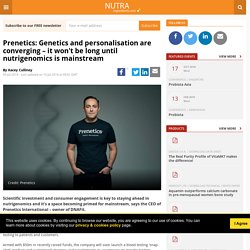
Previously, Prenetics just worked with physicians and business owners who provided genetic testing to patients and customers. Armed with $50m in recently raised funds, the company will soon launch a blood testing 'snap shot' product and customized vitamins and supplements to accompany its genetic testing proposition. Gut microbes' role in mammals' evolution starts to become clearer. National Science Foundation - Where Discoveries Begin Skip to main content NSB Email Print Share News From the Field.
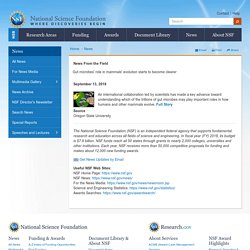
Animal Models for Microbiome Research: Advancing Basic and Translational Science: Proceedings of a Workshop. CRISPR/Cas9 silences gene associated with high cholesterol. National Science Foundation - Where Discoveries Begin Skip to main content NSB Email Print Share News From the Field CRISPR/Cas9 silences gene associated with high cholesterol April 26, 2018.
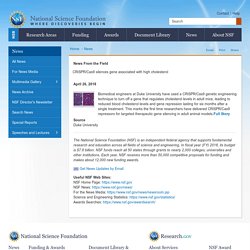
Federal partners release Interagency Strategic Plan for Microbiome Research. News Release 18-032 Interagency group seeks collaboration to accelerate research in critical emerging areas of science and engineering May 1, 2018 A group of 23 U.S. government agencies, including the National Science Foundation (NSF), have joined to produce the Interagency Strategic Plan for Microbiome Research, which outlines the objectives, structure and principles for coordinated research in this important field of study.
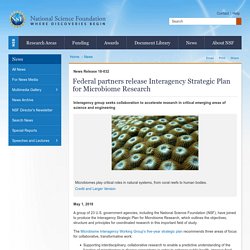
French American Innovation Days Los Angeles 2018 : retour sur la première conférence France-USA sur le microbiome humain. More rice, please: 13 rice genomes reveal ways to keep up with ever-growing population. National Science Foundation - Where Discoveries Begin Skip to main content NSB Email Print Share News From the Field More rice, please: 13 rice genomes reveal ways to keep up with ever-growing population February 1, 2018 Rice provides 20 percent of daily calories consumed globally.
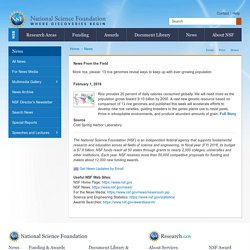
New 'Tomato Expression Atlas' dives deep into the fruit's flesh. National Science Foundation - Where Discoveries Begin Skip to main content NSB Email Print Share News From the Field New 'Tomato Expression Atlas' dives deep into the fruit's flesh February 5, 2018 Researchers at Boyce Thompson Institute, Cornell University and the U.S.
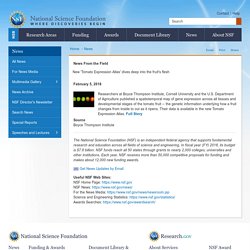
Rapport - Le Microbiome Humain : état des lieux de la recherche en France et aux Etats-Unis, enjeux actuels et futurs. Des chercheurs identifient un groupe de neurones importants dans le comportement alimentaire à l’origine de la préférence pour les glucides. La préférence pour une alimentation riche en graisses est une tendance globale en pleine expansion, caractéristique de notre époque.
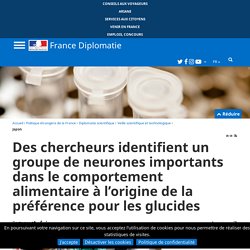
Genome et epigénome de la pomme decodes. Ce nouveau génome a par exemple permis aux chercheurs d’identifier des réarrangements importants qui se sont produits dans le génome de la pomme il y a environ 21 millions d’années.
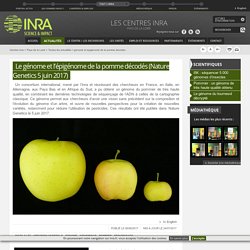
Ces changements pourraient être dû à l’émergence des montagnes de Tian Shan (Kazakhstan), la région d’origine de la pomme. WGS to improve detection of and response to foodborne outbreaks. PulseNet International chose the extended MLST approach as its default phylogenetic analysis tool.
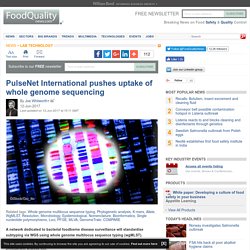
They said it delivers sufficiently high resolution and epidemiological concordance plus unambiguous nomenclature for surveillance. Standardisation will boost sharing of information within regional and global public health laboratory networks enabling data to be compared across countries in real-time which is especially important due to international travel and trade The network includes national and regional laboratories in Africa, Asia Pacific, Canada, Europe, Latin America and the Caribbean, the Middle East and the US.
Donne-moi ton ADN, je te dirai quoi boire ! - ATABULA. On n’arrête pas le progrès.

Le Tritordeum : Une nouvelle céréale bio, fruit du génie génétique. Le lancement d’un premier pain à base de tritordeum par les Établissements Moulin, spécialistes des « pains biologiques aux saveurs authentiques », n’a pas vraiment fait sensation. Pourtant, que de belles promesses à en croire le site créé pour sa promotion ! Faire des tests ADN avec son smartphone. Vous voulez vous la jouer "police scientifique" ? En avant pour la saison 1 des Experts Courbevoie. La société américaine Biomeme vous invite à faire des tests ADN sur tout ce qui vous entoure, sans avoir à passer par un laboratoire, grâce à un mini thermocycleur qui se greffe à votre iPhone. CRISPR gene edited cabbage grown and cooked for the first time. The cabbages were edited using CRISPR (Clustered regularly interspaced short palindromic repeats)-Cas9 technology to remove a segment of their DNA.
The changes – a deletion in the coding region – were expected to alter growing patterns, Umeå University’s Professor Stefan Jansson told FoodNavigator. UK Biobank launches world’s biggest body scanning project to shed new light on major diseases. The world’s largest health imaging study, funded by the Medical Research Council, EFC member the Wellcome Trust, and the British Heart Foundation was launched on the 14th April It will create the biggest collection of scans of internal organs, and transform the way scientists study a wide range of diseases, including dementia, arthritis, cancer, heart attacks and strokes. The £40m study will involve imaging the brain, heart, bones, carotid arteries and abdominal fat of 100,000 current participants of UK Biobank, a visionary project set up in 2006 by the MRC and Wellcome Trust to create a research resource of half a million people across the UK to improve health.
The multi-organ scans will be analysed alongside the vast data already collected from UK Biobank participants. Dr Sara Marshall, Head of Clinical Research at the Wellcome Trust, said: “Capturing such a vast number of images of the human body, in both health and illness, will chronicle disease in a way never attempted before. Nestlé puts €18m on table for epigenetics research. The company has been collaborating with the EpiGen Consortium – a public-private partnership made up of institutions from Southampton, Auckland and Singapore – since 2011.
Nestlé’s contributing scientists work from its research centre in Lausanne, Switzerland. The company said it hoped epigenetics, the study of how environmental factors including eating behaviours could impact genetics of the consumer and therefore future generations, would help it understand more about the importance of maternal nutrition.